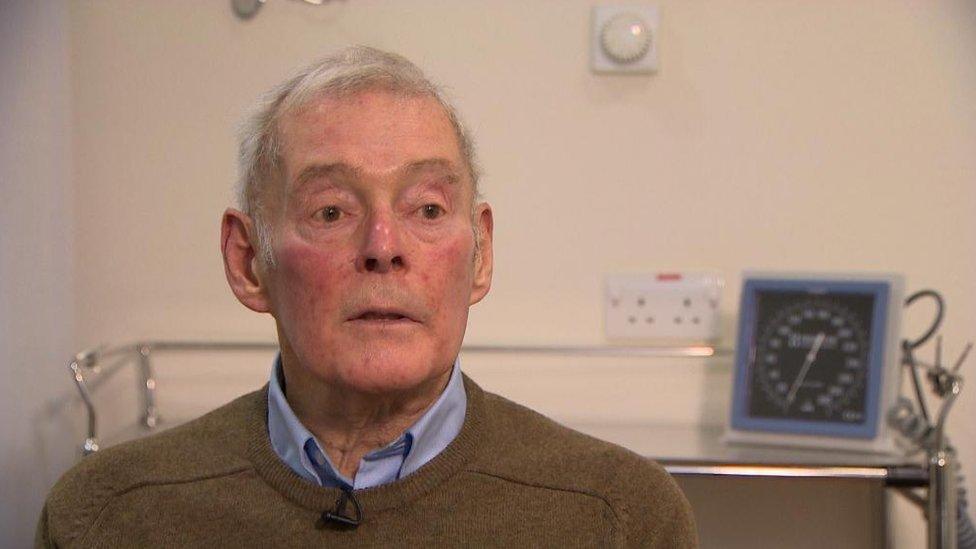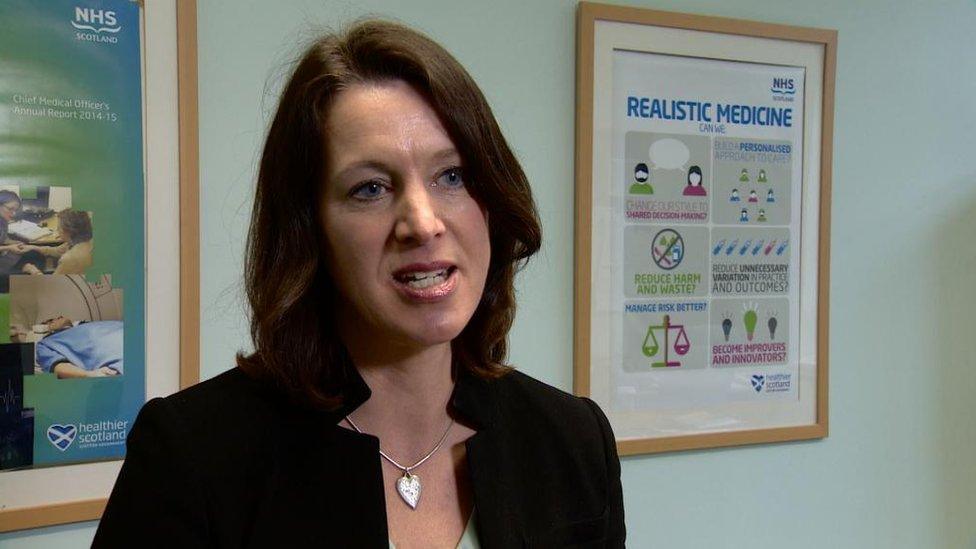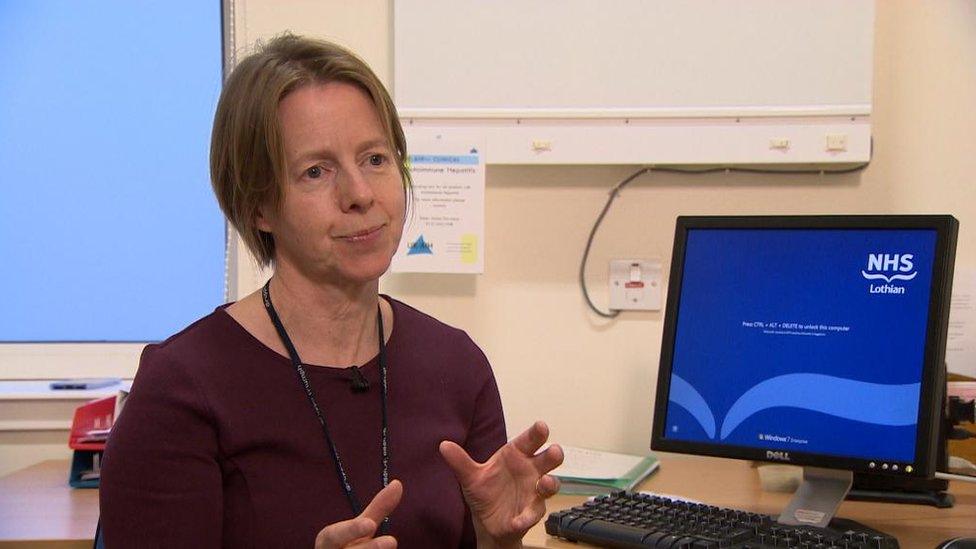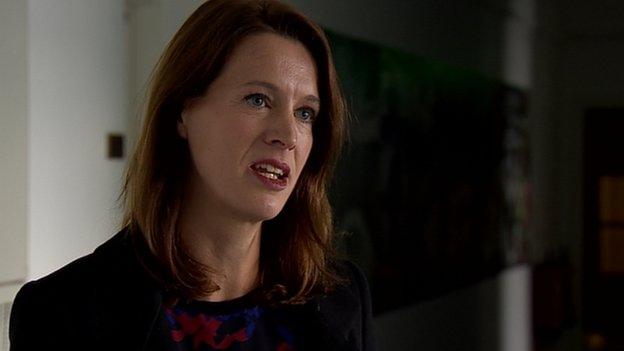Doctors urged to avoid 'over-treating'
- Published
- comments
The chief medical officer wants doctors and patients to have open and honest conversations
Doctors should spend more time listening to their patients in order to avoid unnecessary treatments, according to Scotland's chief medical officer.
Catherine Calderwood wants doctors and patients to have more open and honest conversations about the benefits and risks of procedures or medication.
She argues that quality rather than quantity of life can be more important.
The British Medical Association Scotland said doctors needed time to "learn, teach and reflect".
But its chairman, Dr Peter Bennie, said it regularly heard from doctors that they did not have the necessary time to do this.
Realistic medicine
Dr Calderwood names her plan "realistic medicine" in her new annual report.
She said she came up with the concept in response to research that found that doctors would make different choices for themselves and their families than they do for their patients.
In some areas, realistic medicine is already well established.
When Alastair Macgregor, 76, was referred to Edinburgh Royal Infirmary's renal unit with poor kidney function, he had a conversation with his consultant and decided dialysis was not the right option for him.

Alastair Macgregor chose not to have dialysis
"There is nothing worse than getting towards the end of your life and you realise you wasted day after day," he said.
"As the sun comes up every day I'm looking for something interesting, and it's a bonus day.
"I didn't fancy spending three days of the week in the Royal Infirmary when I can be out doing things with my family. I want quality of life, I don't want length of life particularly."
Dr Calderwood wants to see more of these conversations in hospitals and in GP surgeries across the country.
After speaking to doctors about how to implement realistic medicine, she now wants to involve the wider health community and to consult people on how they can become more involved in a "person-centred" approach to healthcare.
She said she had recently met a man who had undergone surgery.
"When I asked him if he was pleased with his knee replacement he said 'well I want to stand on my doorstep and talk to my neighbour and I asked them for a grab rail and they gave me a knee replacement, and I still don't have a grab rail and I still can't talk to my neighbour'.
"So he had had a major procedure when actually he wanted a simple solution to his problem which was to chat to his neighbour on his doorstep."

Dr Calderwood wants to discuss her realistic medicine plans with the wider health community
Dr Calderwood, who still practices as a consultant obstetrician and gynaecologist, explained that modern medicine tends to over medicalise.
"I think that doctors are fixers, they want to help but I think we have perhaps overestimated the benefits of some treatments and maybe underestimated the risks and perhaps underestimated the burden of healthcare, so visits to hospital, visits to the GP surgery, blood tests, monitoring.
"And now we are having much more open and honest conversations."
Dr Caroline Whitworth, a consultant nephrologist at the renal unit in Edinburgh, is an advocate of realistic medicine but acknowledged it can mean having difficult conversations with patients:
"You've got to be very honest, but you've got to be honest in a sympathetic, empathetic way," she said.
"It's too brutal to say you've got however many weeks or months left and actually we don't know the answer to that.
"But what you do have to be honest about is where you can make a difference and where you might not make a difference.
"And when you are talking about particular treatments you've got to be honest about whether that treatment realistically is going to make a difference."

Dr Whitworth said realistic medicine can lead to difficult conversations with patients
Dr Peter Bennie, chairman of BMA Scotland welcomed the chief medical officer's report and said doctors wanted to engage with patients to provide the best possible care.
He said: "Doctors want, and expect, to be innovators and leaders in improving outcomes for patients, however to do this well we need time to learn, teach and reflect.
"It is good to see that the CMO recognises the need for innovation within the NHS but with the ever increasing demand and high levels of long term vacancies, the BMA now regularly hears from doctors that they do not have the necessary time to do this."
National atlas
He added: "We need to have an honest and open debate with the public and politicians about what the NHS can realistically provide.
"We look forward to further discussions with the CMO on many of the ideas discussed in her latest report, and to hearing more detail on the plans for the development and use of a national atlas of variation and a single national formulary."
Dr Calderwood's annual report is the second phase of the introduction of realistic medicine.
Leaflets will shortly be distributed to hospitals and GP surgeries encouraging people to ask more questions.
There will be a review of how patients consent to procedures in an effort to help them understand more fully the benefits and risks, and there are to be consultations with the public on what realistic might mean to them.
Putting it into practice will mean challenges as doctors are stretched.
Prof Derek Bell, President of the Royal College of Physicians of Edinburgh, said: "Issues such as the overuse of clinical treatments, interventions and antibiotics remain high on the college agenda.
"Patients also need to be treated in the right place at the right time."
- Published27 February 2015
